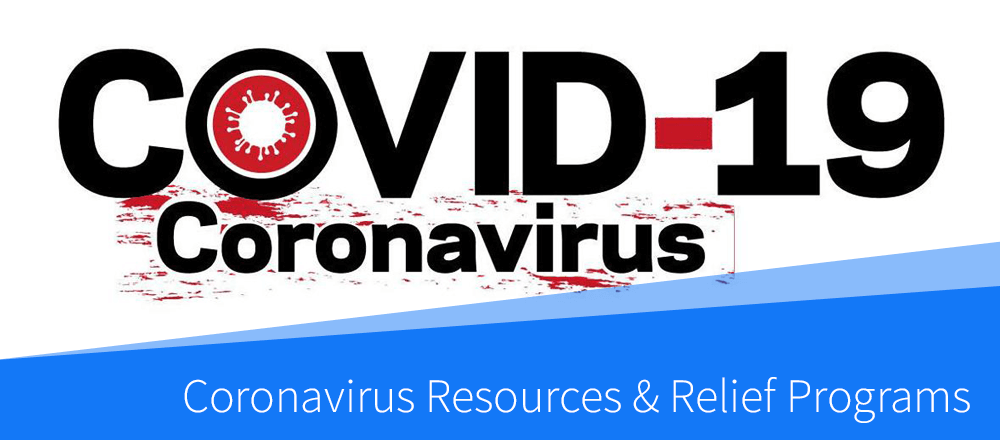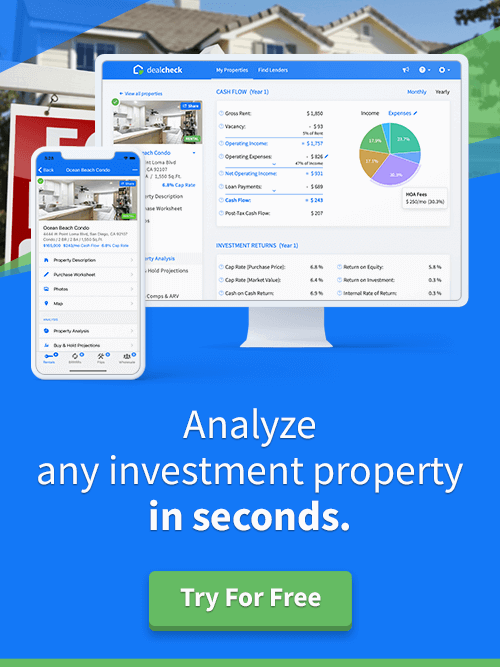As the Coronavirus (COVID-19) pandemic sweeps across the United States and the rest of the world, many landlords and real estate investors are feeling the financial effects of this crisis.
We wanted to help those affected and keep you informed of the latest developments, resources and relief programs available specifically to landlords, real estate investors and businesses, whether you’re affected personally, or due to the financial effects on your tenants.
Quick Links
Working With Tenants Affected by the Pandemic
Financial Relief Programs for Landlords & Investors
- Federally-Backed Mortgage Payment Deferral
- Commercial & Private Loan Payment Deferral
- Small Business Administration Disaster Loans (EIDL)
- Tax Filing and Payment Deadline Deferral
- 1031 Exchange and Opportunity Zone Deadline Deferral
- Updated Rules for Using Retirement Funds for Relief
- Help for Airbnb and Vacation Rental Owners
Additional Information & Resources
What DealCheck Is Doing to Help
Working With Tenants Affected by the Pandemic
Probably the biggest issue facing many landlords is how to approach the situation when a tenant is unable to pay their rent due to Coronavirus-induced hardships.
While this is a highly-debated and controversial topic, we’ve seen many investors and leading industry publications recommend the following 3-step approach:
1. Let your tenants know about available relief programs.
There are numerous local, state and federal financial relief programs available to tenants if they have lost their job or have seen a reduction in their wages. Letting them know about their options is a great first step in improving their financial situation and helping them pay their rent on time.
You can help them by compiling a written list of local and federal programs that you can quickly distribute as a proactive measure, or when one of your tenants expresses that they are facing financial hardship and will not be able to pay their rent.
Here is a list of available financial relief programs to get you started:
- State Unemployment Programs: Every state has an unemployment program that was further boosted by the recently passed CARES Act. Direct your tenants to the local unemployment office or website to help them apply for aid.
- The CARES Act: The US Congress recently passed a relief package that includes direct stimulus checks for most Americans (up to $1,200 for adults, up to $2,400 for couples, plus $500 per child), as well as expanded unemployment benefits. Stimulus checks are expected to be sent out by mid to late April.
- Rent & Utility Assistance Programs: Most cities and states offer a variety of rent and utility payment assistance programs to those facing financial hardship. Look up the list of available programs in your city or county.
- Other Financial Resources: Mint.com has put together an excellent compilation of many financial assistance and relief programs available to individuals affected by the pandemic.
2. Ask for proof of financial hardship.
Unfortunately, while most tenants who request help are honest, some people may try to take advantage of this situation. The best way to deal with this is to gently ask the tenant for written proof of being laid off, collecting unemployment or otherwise being impacted by COVID-19.
Download this example template from the Anderson & Associates law firm or create a similar one yourself.
3. Sign a written rent payment or deferment plan with the tenant.
After verifying the tenant’s inability to pay their April (and possibly following months’) rent on time, consider creating a rent payment or deferment plan with each tenant on a case-by-case basis. These plans would typically require the tenant to pay some of their rent now, and repay the remainder over the course of the following several months.
Once again, the Anderson & Associates law firm has a simple downloadable template to show you what a typical rent payment or deferment agreement may look like.
You may want to consider waiving your normal late fees and being more flexible with your tenants, given these circumstances. Keep in mind, that most counties and states around the country have passed eviction moratoriums, so working with your tenants to collect at least some rent during this time is likely the best option.
Financial Relief Programs for Landlords & Investors
Federally-Backed Mortgage Payment Deferral
The CARES Act, a legislature recently passed by the US Congress, directs lenders holding federally-backed mortgages to suspend borrowers’ payments for 3 to 12 months if they have lost income because of the Coronavirus outbreak. This provision applies to both homeowners and landlords.
Under this provision, if you have a mortgage backed by Fannie Mae, Freddie Mac, FHA or other federal administrations (which includes the majority of conventional 30 and 15 year loans), you should be able to work with your lender to defer your mortgage payments for at least 90 days.
Exercising your right under this provision should not impact your credit score and your lender is required to waive any late payment fees during this time. You also have several repayment options at the end of the deferment period, including lump-sum payments, increasing your monthly payments or adding extra payments to the end of your loan term.
Contact your mortgage lender and references the CARES Act to start this process, which is handled by each individual lender. Read this post from Investopedia and this one from Millionacres with more help and information about this provision.
Commercial & Private Loan Payment Deferral
While there is no federal guidance or mandate regarding loan payment deferrals for commercial or private loans, we have heard that many commercial and private lenders are offering payment assistance and deferral on a case-by-case basis.
We recommend reaching out to your lender directly to ask about what relief programs they currently offer.
You can also take a look at this COVID-19 guide for commercial real estate investors from the National Association of Realtors.
Small Business Administration Disaster Loans (EIDL)
The US Small Business Administration (SBA) is currently offering special disaster loans for small businesses with less than 500 employees, affected by the COVID-19 pandemic. These loans are designed to help businesses pay their payroll, rent, mortgage, utility and other operating expenses.
The current understanding is that these loans are available to most real estate businesses, contractors and self-employed professionals, including brokerages, agents, wholesalers, appraisers, property managers and inspectors. Individual landlords and real estate investors should also qualify in most cases.
The current terms of this loan program are as follows:
- Loan amounts up to $2 million with up to $10,000 loan advance disbursed without waiting for final loan approval
- Interest rates of 3.75%
- Terms up to 30 years
- First 12 months of payments deferred
- No prepayment penalties
Applications for these loans can be submitted through the SBA website. View the Small Business Administration’s official guide and website for more information and guidance about these loans.
Due to large demand, the funds for this program may run out soon, so you’re encouraged to apply as soon as possible if you anticipating needing this loan.
Tax Filing and Payment Deadline Deferral
The US Federal Government has extended the 2019 federal tax filing and payment deadline to July 15, 2020. This should not only ease the stress of trying to finalize and file your 2019 tax returns, but also gives you 3 extra months to pay any taxes due for the 2019 tax year.
Most states have passed a similar measure for filing and paying state taxes.
On the other hand, if you’re expecting a tax refund this year, you may consider not delaying the filing to receive the refund check as soon as possible.
1031 Exchange and Opportunity Zone Deadline Deferral
The latest guidance from the IRS regarding tax filing deferrals is understood to include extending deadlines for filing 1031 exchanges and opportunity zone investments, as explained by Bisnow.
For 1031 exchanges, investors who have to either identify or close on a property between April 1 and July 15 now have until July 15 to do so.
Updated Rules for Using Retirement Funds for Relief
The CARES Act has also modified several rules pertaining to IRA and 401(k) plan loans and early withdrawal penalties:
- The regular 10% IRA and 401(k) plan early withdrawal penalty is waived for amounts up to $100,000, withdrawn for COVID-19-related hardship in 2020
- The limit of the 401(k) loan program has been increased from $50,000 to $100,000 for the 2020 tax year
- Required minimum distributions from IRAs and 401(k) plans have been suspended for the 2020 tax year
While accessing your retirement funds may be a last resort, it is nevertheless available to you, should you need additional capital or operating funds.
Help for Airbnb and Vacation Rental Owners
If you own Airbnb’s, vacation rentals or other short-term rental properties, you’ve likely felt the impact of the Coronavirus pandemic with decreased bookings due to travel restrictions and social distancing measures.
There are a few things you can do to help you weather the storm:
- Reduce your vacancy rates as much as possible by offering discounts and being more flexible during this time
- Cut your expenses by eliminating welcome gifts, reducing amenities and subscriptions or applying for mortgage deferral programs, as discussed above
- If you’re an Airbnb host, apply for cancellation reimbursement under the $250 million Host Relief Fund available for qualifying cancellations (up to 25% reimbursement of what you would normally receive from a canceled booking)
- Consider turning your short-term rental property into a long-term rental, at least for now, as the traditional rental market is not expected to be impacted as severely as the short-term rental market
Hostfully has also put together this page with a collection of resources specifically geared toward short-term rental investors.
Additional Information & Resources
- Resources for Property Owners and Agents from the National Association of Realtors is a great list of general recommendations and resources
- List of Relief Programs Offered by US Banks, published by the American Bankers Association, is a comprehensive list of specific measures banks across the US are taking to help borrowers in need
- State Laws in Response to the COVID-19 Pandemic is a comprehensive list of emergency measures and laws recently passed by each US state, compiled by Ballotpedia
- COVID-19 Tax Resources Center by the Drucker Scaccetti tax services firm
- Legal Guide for Landlords by Julie Anderson, written for the Mid-America Association of Real Estate Investors, provides general legal guidance and advice for real estate investors
- Legal FAQ for Landlords by Andrew McIntyre from Law360 includes answers to common legal issues raised by the pandemic
What DealCheck Is Doing to Help Investors & Small Businesses
15% Off All DealCheck Plans for Those in Need
To help investors and small businesses who would like to use DealCheck Plus or Pro as part of their operations, but are financially strained, we are offering a 15% discount across all of our subscription plans with the SPRING20 promo code.
This promotion is available to all new subscribers. Enter this code when upgrading your account online (it is not redeemable through our mobile app) to receive a 15% discount on your subscription for as long as it’s active.
Please note that this promotion has expired and is no longer available.
All Affiliate Commissions Temporarily Increased to 50%
To do our part in helping small businesses and individuals (which make up the bulk of our affiliate base) we are temporarily increasing all affiliate commissions to 50%, effective immediately.
This increase will apply to any affiliate sales generated during this time, and we intend to keep it in place until the crisis is over. Sign up for our affiliate program today to start earning passive income from referral sales.
Please note that this promotion has expired and is no longer available.
Note: We will update this page with the latest information as it becomes available to us. Please let us know in the comments below if we missed anything.



